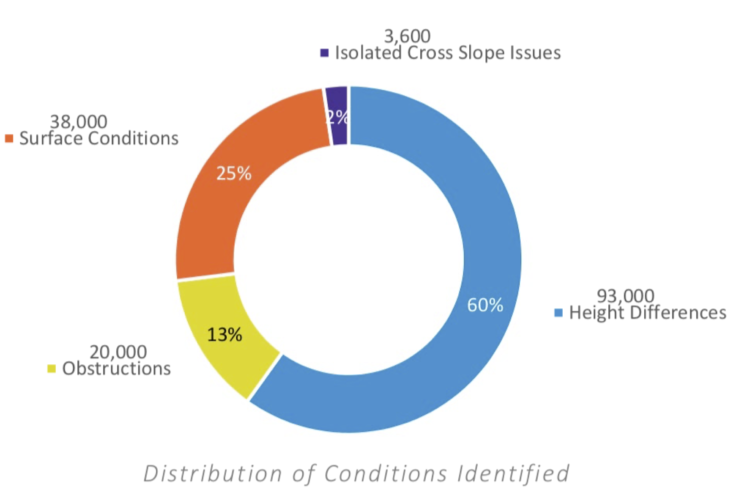Seattle now must repair/build sidewalks when undertaking major street projects
 From the 2018 SDOT Sidewalk Condition Assessment Report (PDF).
From the 2018 SDOT Sidewalk Condition Assessment Report (PDF).SDOT should no longer be able to make a significant road repair project without ensuring that at least one side of the street has a sidewalk and completing any necessary repairs. The City Council approved a new ordinancelast week that will make sure SDOT no longer makes large street investments that ignore the adjacent sidewalks.
Seattle is missing about 11,000 blocks of sidewalk, and a 2018 study found 154,000 instances of sidewalk deficiencies in the city. To put the enormity of this sidewalk work in context, the ordinance includes this whopper of a whereas clause: WHEREAS, at the current annual rate of new sidewalk construction (approximately 27 blocks per year over the course of the Move Seattle levy), it will take 407 years before all of Seattle streets have sidewalks;"
This is an overwhelming amount of work, and it's going to take a lot of different strategies to make significant progress on the problem. This ordinance will only make a dent in the total, but every new block of sidewalk or repaired tree root heave is a big deal to the people who use them. We argued in September that now is the perfect time to pass this ordinance because it gives time for the authors of Seattle's next transportation funding measure to price this sidewalk work into their cost estimates.
The new ordinance builds on the 2019 bike lane ordinance, which itself was crafted as a strengthening of the city's existing complete streets ordinance. Both the bike lane and now sidewalk rules define a major project" as one costing $1 million or more. Something to note here is that some bike lane projects may themselves cross the $1 million mark, triggering the sidewalk rule. So SDOT may need to update their per-mile cost estimates for bike lanes to account for this.
The bill does include wiggle room for the SDOT Director to declare a project exempt from this new rule if the characteristics of the physical features or usage of a street, or financial constraints of full compliance prevent the incorporation or restoration of sidewalks or the demonstration of pedestrian and bicycle improvements." So as with all new rules like this one, advocates and neighbors will need to keep an eye on the department's work to make sure they are following the spirit of the law. Each year, the SDOT Director will need to present to the City Council explaining all the exemptions they plan to give to projects.
Councilmember Tammy Morales sponsored the bill, and Disability Rights Washington took a leading role in advocating for it along with Smart Growth America, Commute Seattle, Seattle Neighborhood Greenways, former SDOT Director Sam Zimbabwe, America Walks, and the American Heart Association," according to a press release from Councilmember Morales:
Seattle City Councilmember Tammy J. Morales (District 2 - South Seattle) celebrated the unanimous passage of legislation she sponsored that will help create new and repair existing sidewalks throughout the city.
The legislation will require the Seattle Department of Transportation (SDOT) to install a sidewalk or fix deficient sidewalks along the street during major paving projects.
Approximately 24 percent of Seattle's streets are missing sidewalks. At the current annual rate of sidewalk construction, it would take 407 years before every Seattle street had a sidewalk. North and South Seattle lack sidewalks the most and both see disproportionately high numbers of pedestrians and cyclists being killed by vehicles.
Sidewalks are essential public infrastructure that provide a public good and enables mobility for everyone regardless of age, ability, or income," said Councilmember Morales. Investing in sidewalks means investing in our whole community. I'm proud to have worked with Disability Rights Washington, Smart Growth America, Commute Seattle, Seattle Neighborhood Greenways, former SDOT Director Sam Zimbabwe, America Walks, and the American Heart Association to get this legislation passed."
This legislation will apply to all projects that cost more than $1 million. SDOT's director will have authority to determine if full compliance with the requirements is not possible on any given project. SDOT will also have to give annual updates to Council about their progress.
Additionally, the legislation also creates a new policy prioritizing sidewalk creation and improvements in areas:
- Where pedestrian movement is impaired by the absence of sidewalks,
- Where sidewalks would provide access to schools, parks, and transit,
- That are very dense, and
- Equity-priority areas where people are at high risk of displacement.